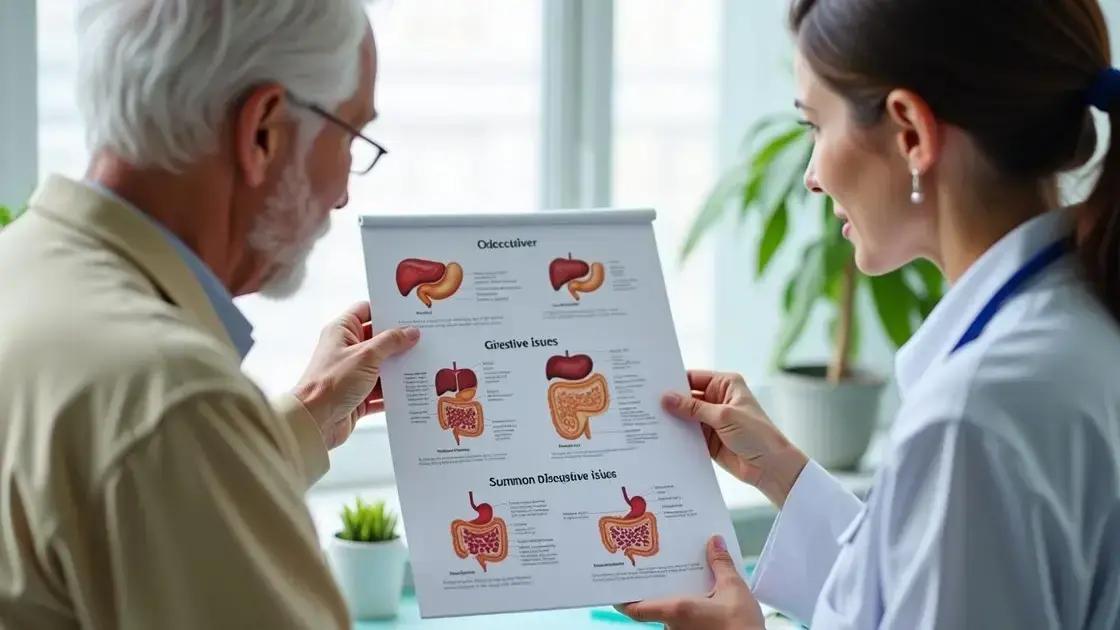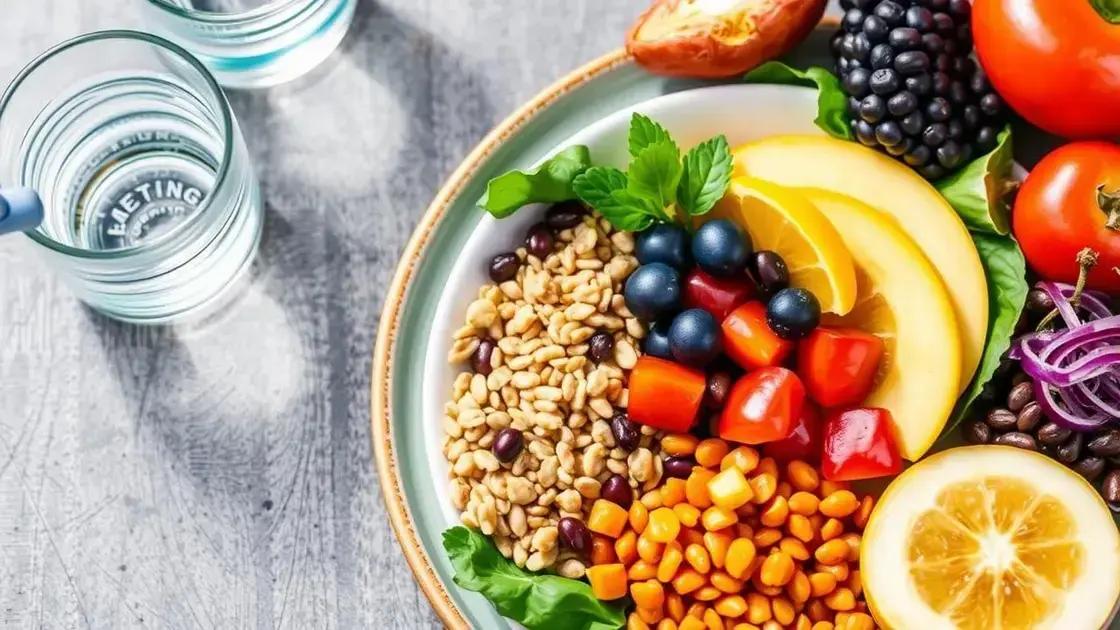To avoid common digestive issues after 50, focus on increasing fiber intake, staying hydrated, exercising regularly, and being mindful of what you eat. Incorporating these practices can greatly improve your digestive health and comfort.
As we age, our bodies undergo various changes, including our digestive system. How to avoid common digestive issues after 50? This question becomes increasingly relevant, as many individuals experience discomfort due to digestive issues. In this article, we will explore the shifts in digestion, identify common problems, and provide effective strategies to maintain digestive health. Understanding how to navigate these changes can lead to a more comfortable and vibrant life in your golden years.
Understanding Digestive Changes After 50

As we age, our bodies experience significant changes, and digestion is no exception. Understanding digestive changes after 50 is vital for maintaining health and comfort. Our gastrointestinal tract slows down, making digestion less efficient. This can lead to various digestive issues, from bloating to constipation.
Slower Digestive Process
One of the primary changes is a slower digestive process. Muscle contractions in the digestive tract weaken, which can hinder the timely movement of food. This slowing might result in increased gas and discomfort, as food spends longer in the system.
Altered Gut Microbiome
Another factor is the alteration in our gut microbiome. A diverse gut microbiome is crucial for effective digestion and nutrient absorption. Research suggests that as we age, the variety and number of beneficial bacteria may decline, leading to less effective digestion and increased digestive issues.
Changes in Digestive Enzymes
Moreover, the body produces fewer digestive enzymes, which are essential for breaking down food. These enzymes play a vital role in processing proteins, fats, and carbohydrates. A decrease can make it harder for the body to absorb vital nutrients.
Impact of Medications
Many older adults take medications that can impact digestion, such as pain relievers or blood pressure medications. These drugs can create side effects that lead to further digestive discomfort. Knowing medications that affect digestion is essential for managing overall health.
Overall, being aware of these changes can help individuals take proactive steps in managing their digestive health. By understanding how our bodies adapt, we can implement effective practices to cope with digestion and enhance well-being as we age.
Top Digestive Issues to Watch For

As we age, certain digestive issues become more common and may require our attention. Top digestive issues to watch for include:
Constipation
Constipation is a common problem, especially for those over 50. This occurs when bowel movements become infrequent or difficult to pass. Factors like decreased physical activity and reduced fiber intake can contribute to this issue. Increasing water and fiber-rich foods can help alleviate constipation.
Acid Reflux
Acid reflux, also known as gastroesophageal reflux disease (GERD), is another concern. People over 50 often experience heartburn and regurgitation due to weakened lower esophageal sphincter muscle. Avoiding trigger foods such as spicy items, chocolate, and caffeine can reduce symptoms.
Bloating and Gas
Bloating and gas can be uncomfortable and may feel embarrassing. These symptoms often arise from the digestion of certain foods, like beans, carbonated beverages, or dairy, as the digestion process slows down with age. Keeping a food diary may help identify specific culprits.
Diverticulitis
Diverticulitis is an inflammatory condition that affects the colon. It occurs when small pouches develop and become infected. This is more prevalent in older adults. Symptoms include abdominal pain and changes in bowel habits. A diet high in fiber can help prevent this issue.
Being aware of these digestive issues can empower individuals to adopt healthier habits. By recognizing symptoms early on, individuals can seek proper treatment and make necessary lifestyle changes to improve their digestion as they age.
Effective Dietary Tips for Better Digestion

Improving digestion is essential, especially after 50. Implementing effective dietary tips for better digestion can make a significant difference. Here are some key strategies:
Increase Fiber Intake
Fiber is vital for digestive health. Aim for both soluble and insoluble fiber to help prevent constipation and promote regular bowel movements. Foods rich in fiber include fruits, vegetables, whole grains, and legumes.
Stay Hydrated
Water plays a critical role in digestion. Ensure you drink enough fluids throughout the day. Proper hydration helps break down food and absorb nutrients efficiently. Aim for at least eight glasses daily.
Small, Frequent Meals
Eating smaller, more frequent meals can ease the digestive workload. Large meals can overwhelm the digestive system, causing discomfort. Try having five to six smaller meals instead of two or three large ones.
Limit Processed Foods
Processed foods can be hard on the digestive system. They often contain additives that can cause bloating or gas. Focus on whole, natural foods that are easier for the body to digest.
Chew Thoroughly
Taking time to chew food well can aid digestion significantly. Chewing breaks down food into smaller pieces, making it easier for digestive enzymes to do their job. Aim to chew each bite several times before swallowing.
By integrating these dietary habits into your routine, you can enhance digestion and enjoy a more comfortable experience as you age.
Exercises to Support Digestive Health

Regular exercise is crucial for maintaining good digestive health, especially after 50. Exercises to support digestive health can help improve digestion and alleviate discomfort. Here are some effective exercises:
Walking
Walking is a simple and effective way to encourage digestion. A daily walk can stimulate the digestive system and promote regular bowel movements. Aim for at least 30 minutes a day to reap the benefits.
Yoga
Yoga incorporates a variety of poses that help improve digestion. Specific poses, like the cat-cow stretch and twists, can massage the intestines and relieve bloating. Incorporating yoga into your routine can relax the body and mind while promoting gut health.
Stretching
Gentle stretching exercises can enhance circulation and promote digestive efficiency. Try simple stretches that focus on the core and abdomen. Deep breathing while stretching can also benefit the digestive system.
Core Exercises
Strengthening the core muscles helps support the digestive organs. Exercises like planks and bridges can enhance core stability, which may improve digestive function as a result.
Swimming
Swimming is a low-impact way to get exercise without putting strain on the body. Water movements gently massage the abdominal area, supporting digestion. Aim for swimming at least twice a week if possible.
By including regular physical activity in your routine, you can significantly enhance your digestive health and overall well-being as you age.
Taking Charge of Your Digestive Health After 50
Understanding how to avoid common digestive issues after 50 is crucial for maintaining overall well-being. With the right dietary tips, effective exercises, and a proactive approach, you can enhance your digestive health significantly.
By incorporating fiber-rich foods, staying hydrated, and engaging in regular physical activity, you can support your digestive system. Additionally, being aware of potential issues and addressing them early can lead to a more comfortable and healthier life.
Taking these steps will empower you to make informed decisions about your health and enjoy your golden years with confidence.
FAQ – Frequently Asked Questions About Digestive Health After 50
What are common digestive issues for people over 50?
Common digestive issues include constipation, acid reflux, bloating, and diverticulitis, all of which can affect comfort and health.
How can I improve my digestion as I age?
To improve digestion, consider adopting a high-fiber diet, staying hydrated, and incorporating regular exercise into your daily routine.
What types of exercises are best for digestive health?
Walking, yoga, stretching, core exercises, and swimming are excellent ways to support digestive health and can promote regular bowel movements.
How important is hydration for digestion?
Staying hydrated is essential for digestion as it helps food move through the digestive tract and allows for better nutrient absorption.
Can dietary changes help with digestive problems?
Yes, making dietary changes such as eating smaller meals, avoiding processed foods, and chewing food thoroughly can significantly improve digestion.
What should I do if I experience chronic digestive issues?
If you experience chronic digestive issues, it’s important to consult a healthcare professional for proper evaluation and treatment.













